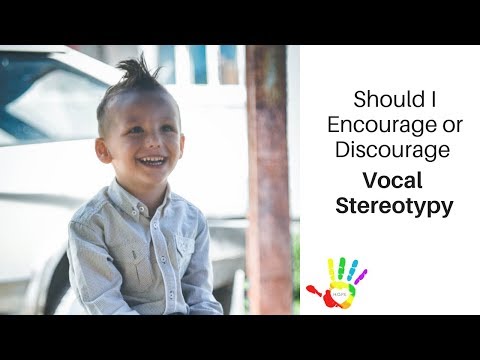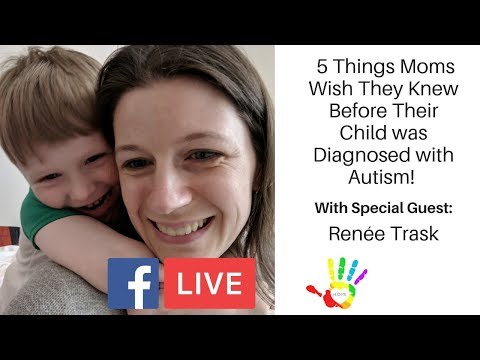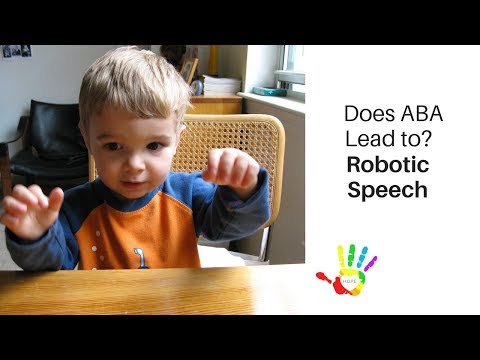Should I Encourage or Discourage Children With Autism From Engaging in Vocal Stereotypy? Parents Parents Like You Ask Me All The Time.
There Are Times When Vocal Stereotypy Can Be a Big Problem and There Are Times You Can Use It to Teach Your Child to Talk. Tune in and Find the Difference!
Find out in this week’s episode!
SUBSCRIBE to our Email List for More Free Premium Content Available ONLY to Subscribers!
Just Visit: https://hopeeducationservices.com
Photo: Morguefile
Sound effect: Incomputek
Intro: Graeme Kan
Disclaimer:
This video is intended for information purposes only. It is not intended to diagnose or treat any medical condition. The text, graphics, images, flash movies, and audio segments are not intended to be a substitute for professional medical advice, diagnosis, or treatment. Always seek the advice of your physician or other qualified health provider with any questions you may have regarding a medical condition.
The information contained in this segment is generalized. It may not be applicable in every situation. Before applying specific interventions, consult a behaviorist. Any behavior intervention can result in an undesired change in behavior if not implemented correctly. No client relationship is established as a result of watching these videos. Jessica Leichtweisz and Hope Education cannot be held responsible for any misuse of the information contained in these videos. <br> <h3>Auto Generated Captions</h3>
[Music]
hey guys it’s Jessica likewise II of
hope education services and thank you so
much for stopping by on my parent
training video every week I post a video
that will help you navigate the world of
special education and autism and
training you want some tips and
techniques that you can use to help your
child learn the most effectively so
tonight the question I got was inspired
by a parent who sent it in and that is
should I encourage or discourage my
child from engaging in vocal stereotypy
now if you’re watching this video and
you don’t know what stereotype is what
it is is those sounds that kids make
that are really not communicated they
don’t have communicative intent so for
example babbling it’s a poet as a form
of staring at opee where a kid who
whistles were even scripting is a form
of vocal stereotype he when a child is
just repeating words that don’t make
sense out of context over and over other
times kids will make sounds from their
throat like they’ll make like those kind
of sounds I made that sound because
that’s a specific one we’re gonna talk
about or you know they’re maybe they’re
making different boys sounds they’re
maybe moving their lips around any time
kids are just repeating sounds over and
over without another person even being
there it without it really meaning
anything so here is the here’s the thing
whenever children go through the natural
process of learning language even if
they learn language much later they
actually repeat all the steps that
infants do so if a child’s three or four
and they’re receiving a BA and they’re
starting to talk for the first time you
know if they’re diagnosed with autism
let’s say and they’re starting to talk
for the first time they may naturally
start increasing in vocal saryati P
they’re exploring their lips their their
sounds their voices their tongues their
muscles and it actually can be a really
good thing in that case we want to
encourage it we don’t want to discourage
it you want to encourage it as much as
you
we can because it’s the prerequisites
oftentimes to language now there’s times
where it’s not appropriate it can be
really interfering for example if a
child is making really loud sounds like
during a circle time in school now then
you might have to discourage it but you
always run into the risk if you’re
discouraging a child who’s nonverbal
from from making these sounds is them
completely becoming silent and then it’s
really difficult to get back to have
them start making those sounds again so
it’s kind of like a catch-22
you know and I and I hate to kind of
just give this answer to use your
judgment but you really have to use your
judgment now when it comes to older
children who are making different like
nonsense sounds if they have for example
communication they have language and
let’s say they’re swinging on the swings
and they’re enjoying it and and rather
than saying mom I’m having so much fun
they’re you know scripting something
from Spongebob that they heard that or
they’re restricting you know something
from Peppa Pei there were scrapping some
sound or repeating something out of
context in that case the best thing to
do would be to redirect it and say hey
listen Jo instead of saying that say wow
this is great or say we like how
redirect them to an appropriate
contextually appropriate something to
say now here is another another
situation to look at so if a child is
young and they’re making a lot of throat
sounds that’s like that those sounds I
told you about it actually can cause a
permanent damage to their vocal cords if
they’re doing that too much and too
often so I had a child that I worked
with that was constantly making those
sounds and we at the time I didn’t know
any better we did not disparage it and
it turned out that she wound up having
some sort of damage to her vocal cords
her she wound up becoming verbal and she
wanted learning to speak but she had
some sort of permanent like voice her
voice was raspy her voice didn’t fully
develop and eventually it resolved
itself but it took a long time to heal
her throat so if you have here those
throat sounds you do want to redirect
that or have it
to stop that you might you know remind
them that that’s not a good idea to do
you know anytime you’re redirecting
stereo atopy and I did another video
about this not specifically vocalist
areata P like this video you really want
to take into account the age of the
child and really like what the child can
know and understand so stereo 2 P is
very very difficult to redirect because
it’s an internally driven process like
if you the desire is a NEET within
someone to engage in that staring at
apiece so you know best times to
redirect it if you’re going to do it is
for an older child who can understand
and is aware of his or her behavior who
really can have some control over
stopping it or giving a different
response and then really when it’s
interfering if it’s not interfering you
know it’s probably okay to let it go and
if you’re in a restaurant or in a movie
theater and a child’s constantly making
sounds and it’s disruptive you may want
to redirect those same sounds at home
because you want to teach the child it’s
never really okay to engage in that
behavior but if it’s something like a
child is much younger or if it’s
something that’s kind of innocuous that
is not really a big distraction or
really won’t infringe upon their ability
to participate in social situations you
may choose just to let them do it and
just to leave it so I hope this video
has helped you I hope that answered your
question I know there’s lots of
different pieces of information in there
and it’s a lot to digest if you still
have any specific questions on this
topic or if there’s an entirely
different topic that you’d love to know
about I am happy to answer these
questions I’m so passionate about
helping families just like you to really
best know how to help their kids learn I
have about 10 years of experience now
helping families affected by autism and
these video series it’s my giving back
to this community that has really
touched my heart and I’m so passionate
about it so if you have those questions
you can email me at Jessica at Jessica I
quess comm I post a video at least once
a week sometimes even more on to this
channel so please subscribe like and
share so these videos can reach everyone
in the world who’s affected by autism
and so you don’t miss any of the
information I share
god bless make it an amazing week and I
can’t wait to see you next time
[Music]
you
you
Should I Encourage or Discourage Children With Autism From Engaging In Vocal Stereotypy kxqiuywNb7g
[Music]
hey guys it’s Jessica likewise II of
hope education services and thank you so
much for stopping by on my parent
training video every week I post a video
that will help you navigate the world of
special education and autism and
training you want some tips and
techniques that you can use to help your
child learn the most effectively so
tonight the question I got was inspired
by a parent who sent it in and that is
should I encourage or discourage my
child from engaging in vocal stereotypy
now if you’re watching this video and
you don’t know what stereotype is what
it is is those sounds that kids make
that are really not communicated they
don’t have communicative intent so for
example babbling it’s a poet as a form
of staring at opee where a kid who
whistles were even scripting is a form
of vocal stereotype he when a child is
just repeating words that don’t make
sense out of context over and over other
times kids will make sounds from their
throat like they’ll make like those kind
of sounds I made that sound because
that’s a specific one we’re gonna talk
about or you know they’re maybe they’re
making different boys sounds they’re
maybe moving their lips around any time
kids are just repeating sounds over and
over without another person even being
there it without it really meaning
anything so here is the here’s the thing
whenever children go through the natural
process of learning language even if
they learn language much later they
actually repeat all the steps that
infants do so if a child’s three or four
and they’re receiving a BA and they’re
starting to talk for the first time you
know if they’re diagnosed with autism
let’s say and they’re starting to talk
for the first time they may naturally
start increasing in vocal saryati P
they’re exploring their lips their their
sounds their voices their tongues their
muscles and it actually can be a really
good thing in that case we want to
encourage it we don’t want to discourage
it you want to encourage it as much as
you
we can because it’s the prerequisites
oftentimes to language now there’s times
where it’s not appropriate it can be
really interfering for example if a
child is making really loud sounds like
during a circle time in school now then
you might have to discourage it but you
always run into the risk if you’re
discouraging a child who’s nonverbal
from from making these sounds is them
completely becoming silent and then it’s
really difficult to get back to have
them start making those sounds again so
it’s kind of like a catch-22
you know and I and I hate to kind of
just give this answer to use your
judgment but you really have to use your
judgment now when it comes to older
children who are making different like
nonsense sounds if they have for example
communication they have language and
let’s say they’re swinging on the swings
and they’re enjoying it and and rather
than saying mom I’m having so much fun
they’re you know scripting something
from Spongebob that they heard that or
they’re restricting you know something
from Peppa Pei there were scrapping some
sound or repeating something out of
context in that case the best thing to
do would be to redirect it and say hey
listen Jo instead of saying that say wow
this is great or say we like how
redirect them to an appropriate
contextually appropriate something to
say now here is another another
situation to look at so if a child is
young and they’re making a lot of throat
sounds that’s like that those sounds I
told you about it actually can cause a
permanent damage to their vocal cords if
they’re doing that too much and too
often so I had a child that I worked
with that was constantly making those
sounds and we at the time I didn’t know
any better we did not disparage it and
it turned out that she wound up having
some sort of damage to her vocal cords
her she wound up becoming verbal and she
wanted learning to speak but she had
some sort of permanent like voice her
voice was raspy her voice didn’t fully
develop and eventually it resolved
itself but it took a long time to heal
her throat so if you have here those
throat sounds you do want to redirect
that or have it
to stop that you might you know remind
them that that’s not a good idea to do
you know anytime you’re redirecting
stereo atopy and I did another video
about this not specifically vocalist
areata P like this video you really want
to take into account the age of the
child and really like what the child can
know and understand so stereo 2 P is
very very difficult to redirect because
it’s an internally driven process like
if you the desire is a NEET within
someone to engage in that staring at
apiece so you know best times to
redirect it if you’re going to do it is
for an older child who can understand
and is aware of his or her behavior who
really can have some control over
stopping it or giving a different
response and then really when it’s
interfering if it’s not interfering you
know it’s probably okay to let it go and
if you’re in a restaurant or in a movie
theater and a child’s constantly making
sounds and it’s disruptive you may want
to redirect those same sounds at home
because you want to teach the child it’s
never really okay to engage in that
behavior but if it’s something like a
child is much younger or if it’s
something that’s kind of innocuous that
is not really a big distraction or
really won’t infringe upon their ability
to participate in social situations you
may choose just to let them do it and
just to leave it so I hope this video
has helped you I hope that answered your
question I know there’s lots of
different pieces of information in there
and it’s a lot to digest if you still
have any specific questions on this
topic or if there’s an entirely
different topic that you’d love to know
about I am happy to answer these
questions I’m so passionate about
helping families just like you to really
best know how to help their kids learn I
have about 10 years of experience now
helping families affected by autism and
these video series it’s my giving back
to this community that has really
touched my heart and I’m so passionate
about it so if you have those questions
you can email me at Jessica at Jessica I
quess comm I post a video at least once
a week sometimes even more on to this
channel so please subscribe like and
share so these videos can reach everyone
in the world who’s affected by autism
and so you don’t miss any of the
information I share
god bless make it an amazing week and I
can’t wait to see you next time
[Music]
you
you
https://i.ytimg.com/vi/kxqiuywNb7g/hqdefault.jpg stimming,stereotypy,autism,aba,special education,applied behavior analysis,applied behaviour analysis,jessica leichtweisz,hope education services,special needs,therapy Should I Encourage or Discourage Children With Autism From Engaging in Vocal Stereotypy? Parents Parents Like You Ask Me All The Time.
There Are Times When Vocal Stereotypy Can Be a Big Problem and There Are Times You Can Use It to Teach Your Child to Talk. Tune in and Find the Difference!
Find out in this week’s episode!
SUBSCRIBE to our Email List for More Free Premium Content Available ONLY to Subscribers!
Just Visit: https://hopeeducationservices.com
Photo: Morguefile
Sound effect: Incomputek
Intro: Graeme Kan
Disclaimer:
This video is intended for information purposes only. It is not intended to diagnose or treat any medical condition. The text, graphics, images, flash movies, and audio segments are not intended to be a substitute for professional medical advice, diagnosis, or treatment. Always seek the advice of your physician or other qualified health provider with any questions you may have regarding a medical condition.
The information contained in this segment is generalized. It may not be applicable in every situation. Before applying specific interventions, consult a behaviorist. Any behavior intervention can result in an undesired change in behavior if not implemented correctly. No client relationship is established as a result of watching these videos. Jessica Leichtweisz and Hope Education cannot be held responsible for any misuse of the information contained in these videos.



